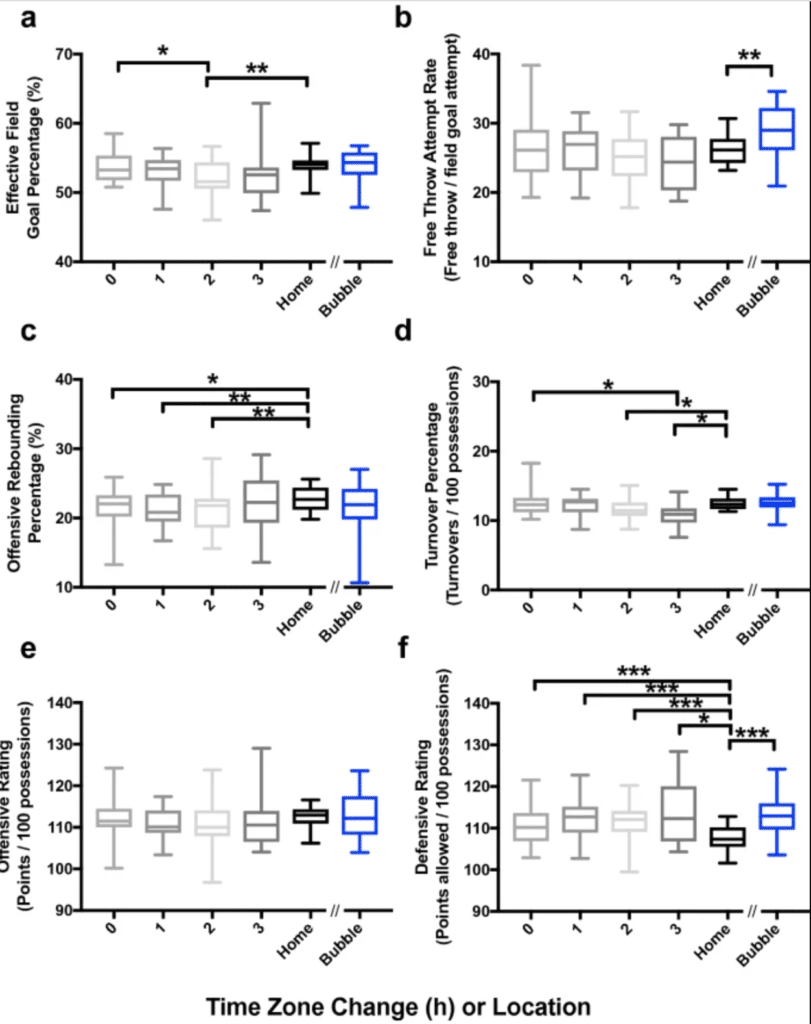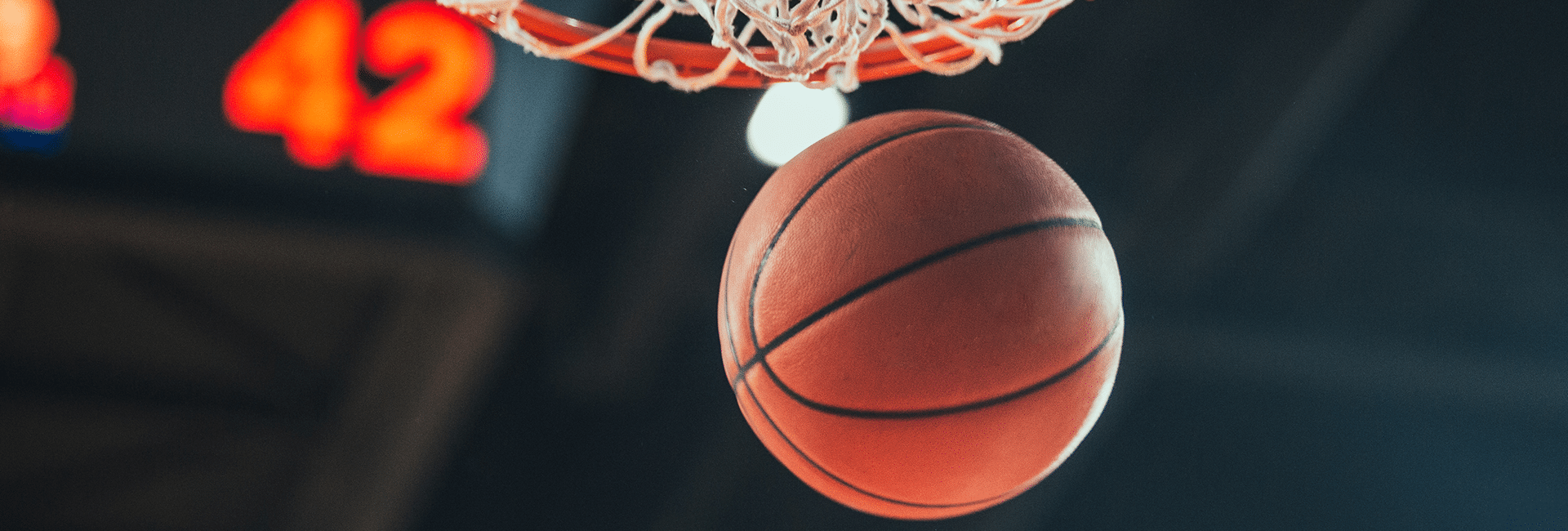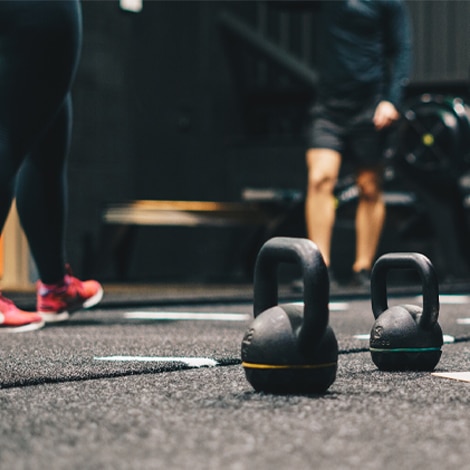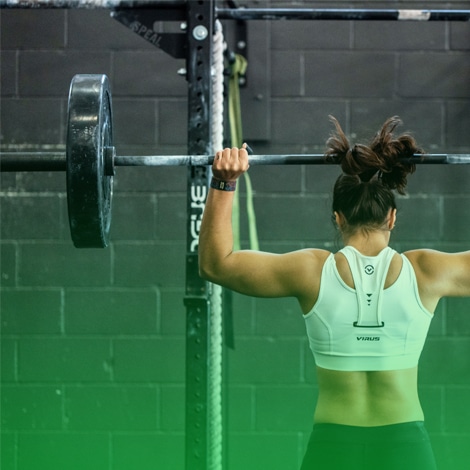In response to COVID-19, the NBA paused its 2020 season, resuming 5 months later with a “Bubble” in Orlando, Florida. All 22 teams involved in the season restart travelled to and stayed ‘on campus’ in Orlando for the 14 week bubble.
For researchers, this ‘bubble’ provided the natural control to examine the idea of the ‘Home-Court’ advantage as no teams were required to travel, and there were no ‘home’ or ‘away’ games.
In this blog we explore the findings from a research article published by Evan Chinoy and Aaron McHill, “Utilizing the National Basketball Association’s COVID-19 restart “bubble” to uncover the impact of travel and circadian disruption on athletic performance” with suggestions for reducing the impact of travel on your own athletes.
“While colloquially referred to as “home-court advantage,” specific reasons for this advantage are often difficult to disentangle due to multiple variables pertaining to game-situations/travel occurring simultaneously (e.g., home-crowd noise, air-travel discomfort, time zone changes, etc.). Thus, natural experiments must be utilized to uncover the impact of travel on elite athletic performance.”
Key Findings
1. ‘Away’ Games negatively affect NBA teams
In a ‘normal’ pre-COVID-19 season, the paper found that teams having to travel across time zones to away games had:
- Reduced winning percentage
- Reduced team shooting accuracy
- Higher turnover percentage
Travel to away games in general showed reductions in offensive rebounding and increases to the number of points the opposing (home) team scores.
2. The ‘Away’ game effect was reduced inside the ‘bubble’
In a scenario where no teams travel to away games, there was a reduction in the typical effects of travel and home-court advantage on winning percentage, shooting accuracy, and rebounding.

3. Home-court advantage in the NBA is linked to the opposing team travelling across time-zones
Home-court advantage in professional basketball appears to be linked with the away team’s impaired shooting accuracy (i.e., precision of the shooting movement) and rebounding, which based on the findings from the ‘bubble’, appears to be linked to travel particularly across time-zones.
This natural experiment inferred that the disruptions to the internal circadian clock, involuntary system that controls and maintains your body biological processes, does indeed assist in home-court advantage. These findings were inferred from previous publications on the impact of high-level activities, such as elite and professional sports, due to circadian disruptions.
The authors describe that although travel is linked to the away team’s disadvantages, further research is needed to examine the relationship between travel and circadian disruption, such as sleep loss and fatigue, mood/mindset, recovery and homeostatic build up (sleep pressure), and the effect on athletic performance.
Therefore, these impacts may be separately influenced by the general effect of travel and home-court advantageous cannot be 100% linked to circadian disruptions. It will be interesting to see more research in this area if the opportunity arises once again.
Suggestions for Limiting the Effects of Travel on Performance
Similar findings have been previously discovered by our clients with the data they have collected in Smartabase.
For one AFL team, they were able to overcome some of the adverse effects of travel on performance by adjusting their travel schedules to arrive a day earlier than usual when presented the opportunity to be flexible.
For those clients who may not have the available flexibility some key findings in previous research published by Leatherwood et al. (2013), can help assist:
- Prior to travel, shift the body clock to the new time zone by 1 hour a day in sleep scheduling.
- Exposure to natural daylight rather than artificial light is recommended.
- Shifting social interaction, much like shifting sleep scheduling, to the appropriate local time at the destination.
- Limiting to avoiding caffeine intake while traveling.
- Avoiding alcohol and consuming extra fluids to fight dehydration while air traveling.
- Smaller meals during air travel is highly recommended. Fasting is also another method of limiting food intake while air travel to time meals to the given time zone.
For further advice on making sleep, recovery and performance work with your travel schedule don’t hesitate to reach out to your Fusion Sport Sport Science Consultant, or contact the team here.

About the Author
Mel McKeveny is a Sport Science Consultant at Fusion Sport with previous experience predominantly working with Olympic sports. Mel has a BS in Exercise Science from SUNY Cortland and a Master of Science in Sports Engineering from Sheffield Hallam University, with a focus in Biomechanical Measurement Techniques.
References and Further Reading
1 Circadian disruption: disturbance of circadian rhythm
2 Circadian rhythm: an internal process, regulated by the Suprachiasmatic Nucleus (SCN), that controls and maintains any biological process that falls into a rhythm and oscillates of about 24 hours (i.e. sleep-wake cycle)
McHill, A.W., Chinoy, E.D. Utilizing the National Basketball Association’s COVID-19 restart “bubble” to uncover the impact of travel and circadian disruption on athletic performance. Sci Rep 10, 21827 (2020). https://doi.org/10.1038/s41598-020-78901-2
Leatherwood, Whitney E., and Jason L. Dragoo. “Effect of airline travel on performance: a review of the literature.” British journal of sports medicine 47.9 (2013): 561-567.








